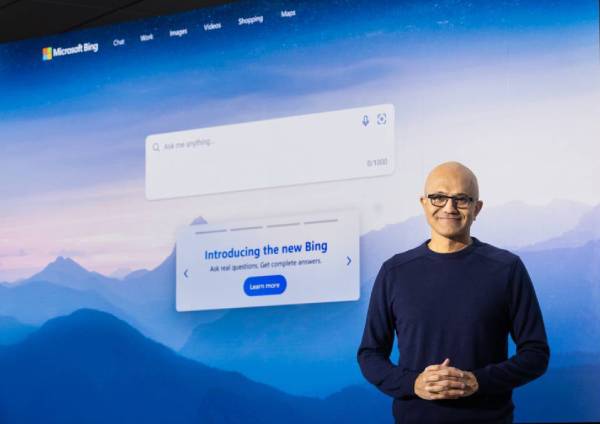
By Anand Parthasarathy
February 9 2023: They are already calling it the ‘Clash of the Tech Titans’. In back-to-back announcements in the US, all in the last 24 hours, Microsoft and Google have announced new online search product rollouts that will leverage an Artificial Intelligence backbone very similar to the sensational ChatGPT chatbot thrown open to the public by developer OpenAI, two months ago today
In a media event at its Redmond, Washington state (US) headquarters, Microsoft’s India-born CEO Satya Nadella, announced a new version of its Bing search engine that will deploy the AI-driven ChatGPT tool. As a heavy investor in the parent company OpenAI, Microsoft is able to harness the chatbot without having to do costly development of its own.
The intention is clear: domination of the hugely lucrative online and mobile search market – and Nadella makes no bones of his aggressive positioning of Microsoft: “The race starts today”, he said.
Google had given some hints of its own efforts in offering its own AI-fuelled chatbot “in the coming weeks and months” in an earnings call with financial media two days ago and had set up a global YouTube date for a mystery announcement later today, Wednesday at 7 pm IST. But the sudden Microsoft announcement has seemingly forced the company to jump the gun and make its core announcement in a blog by CEO Sundar Pichai, who coincidentally is also a son of India.
What are the salient features of the two AI-driven search solutions?
New Chat-GPT-fuelled Bing
The Bing search engine that comes with Microsoft’s Edge browser, will soon incorporate an advanced chat feature. This will allow users to type lengthy queries in conversational language. In response Bing will provide traditional search results plus a response in the style to which ChatGPT has accustomed us. But don’t all rush! Though Nadella’s announcement led one to believe the new Bing was live, when I actually tried to invoke the chat feature, I got a message that I was on the ‘waitlist’ to access the new ChatBPT-fuelled chat. There is also a fast track on offer – if you are ready to make Edge your default browser and install a Bing app. Clever way to scoop in more users for Microsoft browser and search!
Microsoft claimed yesterday, in its own blog that the new Bing is the culmination of four technologies:
-Bing will now run on a new, next-generation OpenAI language model that is more powerful than ChatGPT and customized specifically for search
-Microsoft has developed a proprietary way of working with the OpenAI model that allows users to best leverage its power. This is called Prometheus and gives more relevant, timely and targeted results, with improved safety.
-Microsoft has also applied the AI model to its core Bing search ranking engine, which has led to the largest jump in relevance in two decades.
-The company is reimagining how users interact with search, browser and chat by pulling them into a single, unified experience.
The coming weeks will allow lay users to check out these claimed improvements as Bing opens itself for more users.
Google announces Bard
Not having access to ChatGPT, Google decided to build its own conversational AI capability even two years ago by creating what it calls LaMDA, short for Language Model for Dialogue Applications.
Like Microsoft’s investment in OpenAI, Google too has made a strategic investment in an AI startup, Anthropic, which is working on a competitor to ChatGPT. Last month Anthropic gave a limited test release to its own AI chatbot, named Claude.
With these technologies under its belt, Google has announced its own conversational AI service, named Bard. Pichai explains in his blog:
“Bard seeks to combine the breadth of the world’s knowledge with the power, intelligence and creativity of our large language models. It draws on information from the web to provide fresh, high-quality responses. Bard can be an outlet for creativity, and a launchpad for curiosity…”
Note the emphasis (ours) on ‘information from the web’: This will be a plus point for Google’s AI chatbot challenge because it can integrate its industry-leading search engine into the results – unlike ChatGPT which as of now depends on archived information up to 2021.
Pichai promises: “Soon, you’ll see AI-powered features in Search that distil complex information and multiple perspectives into easy-to-digest formats, so you can quickly understand the big picture and learn more from the web.”
Bard is said to be in a ‘phase of testing’ and the new AI features in Google’s search engine ‘will begin rolling out soon’ – no date set as yet.
While both these tech giants get ready their AI-tipped asthras in what promises to be a technology mahayudh, one development seems to have slipped under our sights: OpenAI has quietly announced a paid version of its ChatGPT tool for US$ 20 a month. The days of freely using the tool to do one’s homework, save on professional writing services or write the next big novella may be numbered.
India innovation angle
It may be coincidental that both Microsoft and Google’s parent company, Alphabet are headed by India-born technocrats – but this assures one thing: the companies don’t need to be sold on the core innovations that have been flowing from the India end of their R&D as well as from supported startups, for decades.
The race to be the best in the marketplace with AI-fuelled conversational search may see both players leaning once more on one of their prime assets: their Indian talent-driven intellectual property.
On his recent visit to India in January, Nadella hinted as much in his interactions with young coding champions in Bangalore.
This article appears in Swarajya